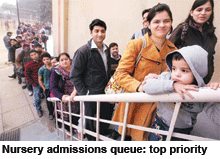Delhi: Policy inertia
With most of India’s cities — especially metros — under-served in terms of privately-promoted primary-secondary schools (middle class households won’t touch government schools with a barge pole), admission of tiny tots into nurseries of Delhi’s most highly-ranked K-12 private schools is a top priority of every aspirational middle class family as it ensures smooth progression of children right up to class XII, because vacancies in upper primary and secondary classes are rare. Therefore in their anxiety to get little loved ones into preschool sections of Delhi’s reputed schools, most parents are ready and willing to buy nursery admissions in schools of their choice — illegal gratification which is strictly forbidden by legislative and case law.
 On December 12, IBN7 (a news channel of the Delhi-based Network 18 Media and Investment Ltd) ran a sting operation exposing some of Delhi’s top schools including Mother’s Pride, Rohini and G.D. Goenka La Petite for negotiating sale of preschool admissions for Rs.2-3 lakh. Inevitably your correspondent’s calls and emails sent to these schools failed to evoke response. However it’s common knowledge that commercialisation of pre-school seats is routine in the admission season (January-March).
On December 12, IBN7 (a news channel of the Delhi-based Network 18 Media and Investment Ltd) ran a sting operation exposing some of Delhi’s top schools including Mother’s Pride, Rohini and G.D. Goenka La Petite for negotiating sale of preschool admissions for Rs.2-3 lakh. Inevitably your correspondent’s calls and emails sent to these schools failed to evoke response. However it’s common knowledge that commercialisation of pre-school seats is routine in the admission season (January-March).
“Even seats reserved for the economically weaker sections are sold. A fake income certificate classifying a household as EWS (economically weaker section) can be easily bought from sub-district magistrate offices for a few thousand. With no checks and balances in place to ensure effective implementation of education policies, business is brisk during the admission season,” says Ashok Aggarwal, founder-president of the well-known NGO Social Jurist.
The major cause of the manic annual rush for private school admissions is that government-run schools show no sign of improvement in the quality of education they deliver. In its 14 years of uninterrupted rule in Delhi, the Congress party has only succeeded in worsening the quality of school education. According to the 37th issue of the Delhi Statistical Handbook 2012 — an annual publication of the directorate of economics and statistics which contains data relating to industrial growth, health, state domestic product estimates, police, crimes, road accidents etc — released in November, education is almost completely neglected. Except for five additions to the aggregate number of middle schools (class VI-VIII) — 583, the number of government schools has remained static. Indeed, their number has declined from 659 in 2008-09. Even though the Union human resource development ministry and the state government seem blissfully unaware, government/municipal schools in the national capital are closing down because even low-income households are increasingly opting to enroll children in private budget schools — despite their being ‘unrecognised’ — offering better English learning or English-medium education.
Yet even as there’s a steady flight of students from Delhi’s 924 primary-secondaries run by the state government/municipal corporation, and plagued by chronic shortages of toilets, water, teachers, infrastructure etc, neither the Union HRD ministry nor the state government have made any effort to liberalise or deregulate the licence-permit-quota regime strangling all private initiatives in school education. Indeed the focus of the HRD ministry and state government’s education department is to enforce the admission of children from underprivileged households into private primaries — as stipulated by s.12 (1) (c) of the Right of Children to Free and Compulsory Education Act, 2009 (aka RTE Act). However there’s no clarity on how private schools will bear the cost of educating poor neighbourhood children when government pays them only the equivalent of per capita student expenditure in government schools. Recently, the state government has also filed a declaratory suit in the Delhi high court praying that 394 private schools, built on land given to them at concessional rates, have to reserve an additional 20 percent of seats at entry level for economically weaker sections — extending the percentage of reserved seats to 45.
“Apart from encouraging the promotion of private schools, the government needs to constitute a panel of expert educators to devise a plan to raise the quality of government primary-secondaries. However, there’s a lack of will among our political leaders to even think about education and give it high priority for the sake of the nation’s children,” says R.C. Jain, president of the Delhi State Public Schools Association (estb. 1992) which claims a membership of 800 private schools in Delhi state.
Quite clearly, until policy inertia, which stifles private initiatives in school education and neglects government schools, is overcome, the rush for admissions into private schools will intensify and under-the-table deals will be business as usual.
Swati Roy (Delhi)














Add comment